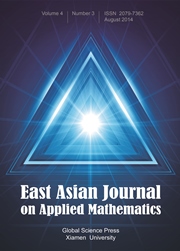Article contents
Simulation of a Soap Film Möbius Strip Transformation
Published online by Cambridge University Press: 07 September 2017
Abstract
If the closed wire frame of a soap film having the shape of a Möbius strip is pulled apart and gradually deformed into a planar circle, the soap film transforms into a two-sided orientable surface. In the presence of a finite-time twist singularity, which changes the linking number of the film's Plateau border and the centreline of the wire, the topological transformation involves the collapse of the film toward the wire. In contrast to experimental studies of this process reported elsewhere, we use a numerical approach based on the immersed boundary method, which treats the soap film as a massless membrane in a Navier-Stokes fluid. In addition to known effects, we discover vibrating motions of the film arising after the topological change is completed, similar to the vibration of a circular membrane.
Keywords
MSC classification
- Type
- Research Article
- Information
- Copyright
- Copyright © Global-Science Press 2017
References
- 1
- Cited by


